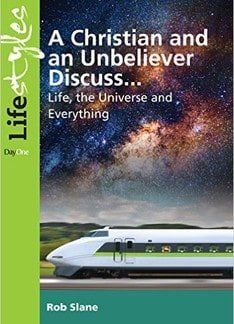Rob Slane tells us he was a committed and dogmatic atheist who became a committed and dogmatic Christian. This book is an imagined conversation between one who is still the former and himself as the latter. It is a composite of conversations he has actually had. This makes the transitions between topics clumsy at times.
The book is intended as an apologetic for Christians in the face of atheistic objections. Much material presented is good and incisive. However, the arguments are a little lacking in grace, with ‘winning the argument and not the person’ an apparent risk. Indeed, one starts feeling sorry for the atheist on the train, who is hardly allowed to get a word in edgeways! In other words, beware of the style and concentrate on the content.
Topics covered include the existence of God, the origin of evil, the basis of morality, the purpose of life, hypocrisy among professing Christians, and why atheists embrace atheism despite its hopelessness (trying to save the planet for people is pointless if there is no point to planet or people).
We are taught that a moral sense must mean that we are made in God’s image rather than evolved from non-life. If there is no God, morality is a meaningless concept. Science cannot disprove God because science is the study of the material universe, while God is transcendent and immaterial.
God cannot be proved to exist, but the evidence for him is overwhelming. Man can never find God by science, but only by humility and repentance for his rebellion. Furthermore, Genesis 3 gives an account of the origins, definition and judgment of evil — not to mention its cure. Atheistic humanism, meanwhile, cannot.
If you converse with committed atheists, there is help here in the face of their common objections. This is a useful addition to our armoury in the fight against satanic strongholds.
John Palmer
Tredegar







